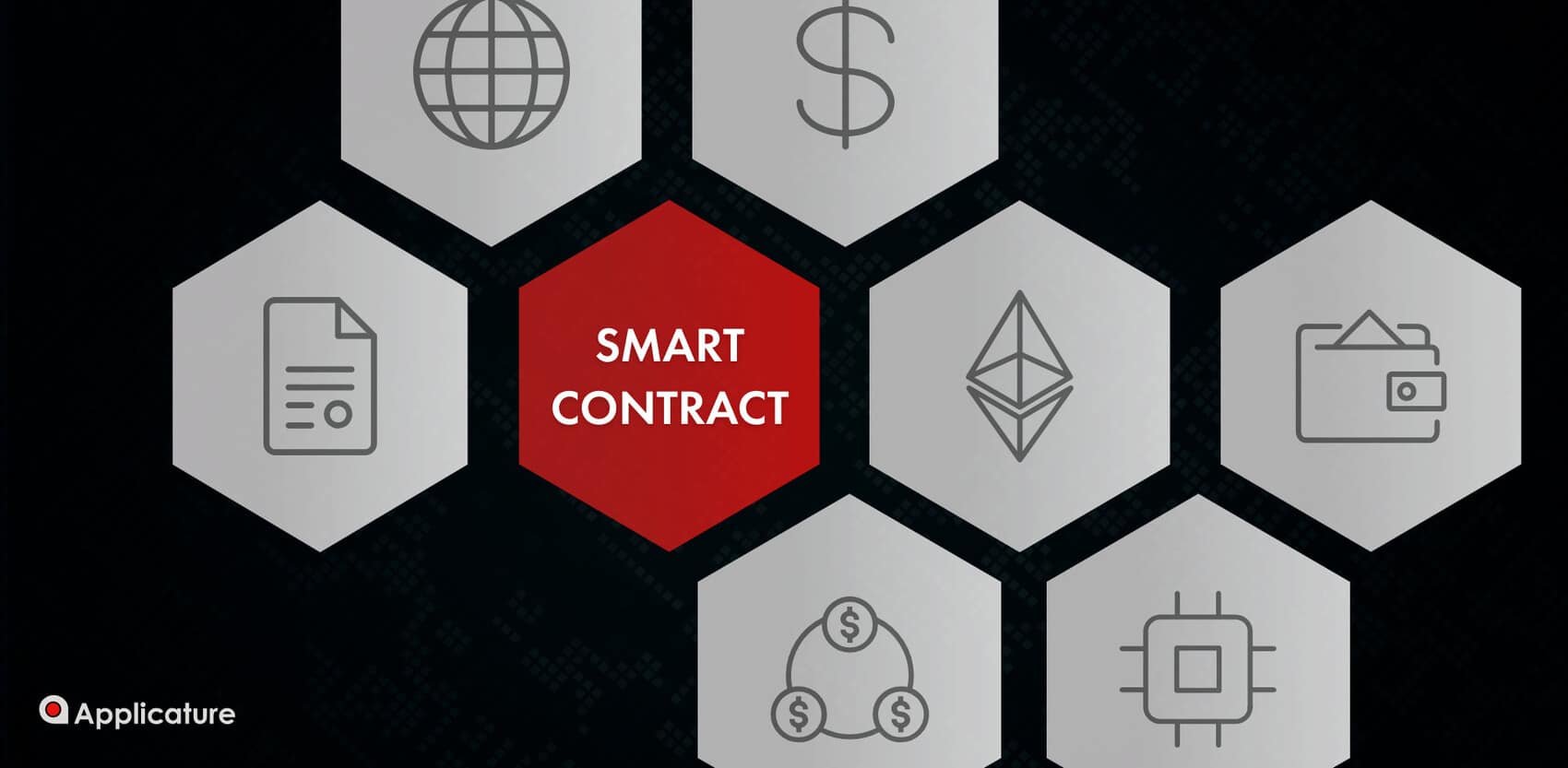
What is Blockchain and How it Works?
To start with, let’s highlight the keystones of the innovative blockchain technology, that has become disruptive in the new data shift. The blockchain is the immutable and distributed ledger, where all transactions are fixed and saved between all the nodes in the network. The data is visible to everyone in the network through transaction history, and transactions cannot be changed and erased without the consensus protocol between the participants in the system.
One more substantial feature of the distributed technology is decentralization, that ensures transparency and traceability of business processes. Smart contracts blockchain is the key guarantee of trust without the need for middlemen. Thus, a payment-cost model is totally changed. Blockchain architecture makes transactions theoretically hard and practically impossible to tamper. We help businesses select and deploy the right blockchain technology for their business cases through smart contracts. They provide an additional level of security and reduce costs without the need for third-party accounting services.
What is a smart contract?
The traditional contract determines the terms of the relationship in the context of law, whereas smart contract outlines the agreement between the individuals with the help of cryptographic code.
The term “smart contract” was firstly described by the prominent scientist in the sphere of IT and cryptography, Nick Szabo in 1996. He advanced a theory that the digital revolution made new ways to formalize relationships via blockchain-based smart contracts without artificial intelligence. According to his publication Smart Contracts: Building Blocks for Digital Markets:

Nowadays smart contracts using blockchain technology have gained popularity due to the possibility to conclude credible agreements. In essence, smart contracts are digital decentralized applications written by codes that are stored on blockchain network. Furthermore, transactions are completely distributed, and there is no centralized control of the assets.

Why use smart contracts? (benefits)
This question is reasonable, especially when it relates to an expensive third-party control. Let’s take deep dive into the smart contract process of execution from the point of its advantage over the traditional law contracts.
No need for multiple intermediaries
Collaboration between all the players in the network is performed directly without the middlemen. Correspondingly, smart contracts are autonomous and are based upon a package of instructions agreed by the participants. Since there is no need for third parties, smart contracts provide scope for reduction of transaction costs and delays. The only transaction fee is required.
Transparency and immutability
Smart contracts are executed in a transparent manner. Everyone in the network has access to the transaction history. It is impossible to shift data without the participants’ conformation called consensus protocol.
Trust
Based on the certain level of permission, the parties in the smart contract blockchain have end-to-end visibility of the network. The decentralized peer-to-peer model allows involving the participants in open transparent collaboration with each other, having no opportunity to skip or deceive.
Safety
The transactions that are stored on the blockchain are encrypted by the private key. It is a huge obstacle which makes impossible for a hacker to conduct dark operations.
Fast-speed operations
Since smart contracts are self-executed, it takes minimum time to perform the transaction.
Accuracy
Computer code is a pre-written logic applied for calculation, data storage or different kinds of transactions. Its basic logic is precious and accurate, leading to zero errors. However, in this case, it is worth mentioning about security vulnerabilities, that are caused due to human mistakes and common errors. Among them are: gasless send, exception disorders, immutable bugs etc.
Ethereum vs. Bitcoin
When it comes to Bitcoin, people used to confuse this notion, as the authentic definition of Bitcoin concerns the digital asset, namely the cryptocurrency. There is no doubt that Bitcoin is dominant in the cryptocurrency space and it was the pilot to provide smart contracts, but it is limited to the cryptocurrency use case. However, Ethereum is a platform with much more options and possibilities. This platform supports a suite of computational functions specifically for smart contracts implementation.
Ethereum is the most outstanding open-source decentralized blockchain platform for smart contracts and an engine for building the decentralized applications (Dapp). While Bitcoin is the platform for digital currencies, the main purpose of Ethereum is smart contract performing. A wide spectrum of industries is attracted by Ethereum platform due to its possibility to implement smart contracts. Therefore, Ethereum digital currency (ETH) gained a huge popularity and increased tremendously in value since it was first created.

Interested, why there is so much hype around this innovative and disruptive phenomena? Let’s see how smart contracts are run on the Ethereum.
How do Ethereum Smart Contracts Work?
Smart contracts are one of the preferences that set Ethereum apart from other blockchains. To activate smart contract a buyer should fund it by ETH (Ether), a fuel payment for smart contract processing. Further, a smart contract is mutually agreed upon the conditions of its execution between the parties. If the conditions are met, and the code is applied on a decentralized platform, funds are automatically transferred. Here’s an example of the smart contract, taken from Solidity website:

EVM
So, to move on let’s firstly explicate the execution model of smart contracts. Ethereum Virtual Machine is a decentralized computer, where the part of the protocol, actually, processes the internal environment state and executes the computational operations.
According to Ethereum White paper:

Correspondingly, smart contracts are absolutely functional, performing computations in any language. The consensus is a protocol confirmed by all the computers executing the code. It means that all the conditions were met and the code was executed in the right way.
It is worth noting about the security of EVM in such a case. By the way, at Ethereum Development Conference 3, which was held in Mexico in 2017, Martin Swende paid attention to this matter. In order to prevent the problems with consensus and to detect implementation differences, an op-by-op view of the internal state of EVM is needed. Evmlab, the package of various tools for interaction with the Ethereum Virtual Machine. makes it possible to construct EVM assembly pythonically, to investigate potential consensus issues and performance bottlenecks, to dissect attacks on a low level.

Gas
When you do something on a blockchain, for example, send tokens, make transactions or execute a smart contract, you have to pay for the computational operations. The gas is the unit for payment, which is calculated in ETH.
Therefore, in order to confirm the transaction, you need to pay gas fee (gas limit*gas price). Let’s make a brief overview to distinguish these two notions “gas limit” and “gas price”. Gas limit is the maximum amount of gas you have to pay per one transaction. It is not reasonable to lower the gas limit, otherwise a transaction will not be successful due to the error “Out of gas”. In the case, if your gas limit is left, it will be refunded at the end of a transaction. So, to determine enough limit of gas will be more provident for the transaction.
Gas price is the amount you pay for a gas unit. If the gas price is increased, the transaction will accordingly be mined faster. The price reducing, on the contrary, takes much time for transaction mining.
So, why the amount of gas price is so determinant factor during the mining? Actually, it is the motivation tool in the form of compensation fee for miners to deploy a smart contract, that is paid by the person who initiated smart contract or the creator of the transaction.
Technically, gas is the unit of estimating the level of complexity of computational instructions. It means the more complicated smart contract operation is, the more high gas will be compensated for its code execution. The purpose of gas price is also to control the amount of work performed and to motivate miners (computers) to write codes and gain payment for its implementation.
Solidity
Smart contracts are written in three languages: Solidity, Serpent, LLC. However, Solidity is the most functional scripting language. here is such a definition on the Solidity web site:


Where to implement Smart Contracts (options)?
A wide range of industries is involved in the ledger technology with its ability to maintain privacy and security in the business development. Smart contracts are the solution for blockchain implementation. The most popular options for implementing smart contracts are initial coin offerings that are used for fundraising startups, similar to traditional crowdsale in combination with token sales.
Want to know more about an ICO and how it works in the context of smart contracts deployment? If you are interested in setting up an ICO project, we offer you to read our article on ICO guidelines.
ICO Smart Contracts: perfect use case for crowdfunding projects
ICO allows funding of projects through the sale of tokens or crypto coins. During the ICO project, a company distributes its own cryptocurrency called “tokens” to the investors in exchange for existing cryptocurrencies (like Bitcoin or Ethereum). The motivation for the investors to contribute a project is that the price of the token would be much higher than the token’s price during the ICO. They can trade them on the public cryptocurrency exchanges, to obtain a considerable increase of the tokens. It is such a scheme of a relationship between the founders of the projects and their contributors.
The second, let’s talk about the process of ICO smart contracts implementation and the benefits they provide to the project itself.
It is worth noting that in summer 2014, Ethereum was initially an ICO project, being a pioneer in the initial coin offering space. Ethereum team raised $18 million. Ether’s debuted price amounted 0,311.
At this very moment of writing an article, ETH amounts $1 124,99. Today ETH is the second largest crypto currency in the world in the terms of market capitalization. Sounds impressive, right? According to Coinmarkatcap, the current state of the market is like this one:

The principles of ICO smart contract
So, what’s it all about? Let’s get down to business. Before we go any further, imagine for a moment that you have already ideas to develop your fascinating ICO project on Ethereum platform, and do need funds for implementing it into the life, but you are not sure how to gain trust in contributors’ minds. Smart contracts blockchain is the powerful solution!
Basically, smart contract creation is the source of trustworthy, safety and decentralization. This means that supporters’ money is distributed correctly without a middleman or clearing houses. Let’s get deeper into the smart contact system to craft the insight of its principle.
Codes in the contract are written in the program, which ensures that all received money will be held in it until the goals are reached. Depending on the result, the funds will be either automatically transferred to the project’s team or returned to the contributors. Such operations really motivate investors to make contributions and be involved in the project’s life, as they are convinced in their investments returns in the case of a project failure. It’s pretty obvious once you think about it.
ICO & Token Design Framework
Once deployed, smart contracts are immutable, publicly exposed and designated to hold substantial economic value. Throughout our ICO projects, Applicature has created token design framework born from our accumulated experience and industry best practices.
The framework introduces guidelines, processes, technical requirements, and security checklists for smart contracts development.
Starting with co-creation session for a token concept, we build thorough requirements documentation, implement the contracts, run the series of internal code reviews, cover the contracts with automated tests, run customer experience tests and deliver the explicit master report.

Deployment of smart contracts
In this section, we are going to provide an understanding of Ethereum smart contract key concept at the deployment phase. So, once the smart contract is created, it has to be deployed on the Ethereum network in order to view the results of its execution. But wait! Before trying smart contract codes in the real network, the critical path of their creation has to be tested. Let’s consider the main phases of a contract deployment:
- Testing on Testnet
- Deployment on actual Mainnet
- Etherscan verification
Testnet
Testnet is an Ethereum network analog, aimed to test the contract, detect bugs and mistakes in codes. It is supported by real nodes without using real Ethers, they have no value. In order to deploy a smart contract and make transactions, firstly, you should download and install Mist (Ethereum Wallet), There are other wallets to use for deployment: MyEtherWallet or Parity.

Let’s use Mist. Then you need to choose one of the testnet networks. Among them are the following: Kovan, Ropsten, Rinkeby. We use the last one.

Once Mist is installed and the test network is chosen, you can start deployment. Let see exactly how this works. In the menu bar, choose “Contracts” —> “Deploy new contract”.
Before we go any further, one more essential factor should be taken into the consideration. Guess what? The number of Ethers in the wallet. You may request funds via Rinkeby Authentication Faucet.

In the smart contract folder, find the Solidity contract source code, copy it and insert to the appropriate field in “Deploy new contract” section.

Pin the contract and enter all necessary data in constructor parameters of the smart contract.

The last step is to press deploy button, enter your pin and password to confirm the transaction. Once it is confirmed, the contract is deployed.

To see the contract deployed, go back to the wallet tab. Sounds good? Now click on the smart contract. You have a variety of options to use:

Mainnet
Mainnet is the main network with the real environment and real Ethers. With all these skills on hand, you can easily pass to smart contract deployment on the actual main network.
Etherscan verification
Verifying your smart contract on Etherscan is the last no less significant stage of the process. What do you need here? First, post uncompiled Solidity Source code to Etherscan. Afterward, Etherscan compiles it, and if the source code matches the bytecode deployed, it is verified correspondingly.

Gratulations! Here’s all you have to do to implement your smart contract deployment targets. Seems attractive? Check it out with Applicature insights and support.
Summary
Blockchain bases smart contracts are the substitution of traditional law contracts to solve the issues of transparency and security, providing more scope for use cases.
- The consensus protocol is a participants’ confirmation, that allows the performance of smart contracts in a transparent manner.
- The transactions that are stored on the blockchain are encrypted by the private key.
- The smart contract enables fast-speed transactions, ensuring the reducing of cost delays and paperwork.
- The basic logic of smart contracts is precious leading to zero errors.
- Smart contracts are autonomous which means they do not need intermediaries or other third parties.
- In order to launch an ICO project, a smart contract is the main engine for safe and secured project implementation with the guarantee to return funds back to contributors in the case of the project fiasco.


 Blockchain Education: a Should-Have or a Must-Have?
Blockchain Education: a Should-Have or a Must-Have?
 Smart Contract Mistakes: Implementation Bugs & Pitfalls
Smart Contract Mistakes: Implementation Bugs & Pitfalls
 Mark Stoner Has Joined Applicature Team in San Francisco
Mark Stoner Has Joined Applicature Team in San Francisco
 “VC vs. ICO” Panel Discussion in Silicon Valley: Hot Insights from Venture Capitalists and Crypto Hedge Representatives
“VC vs. ICO” Panel Discussion in Silicon Valley: Hot Insights from Venture Capitalists and Crypto Hedge Representatives
